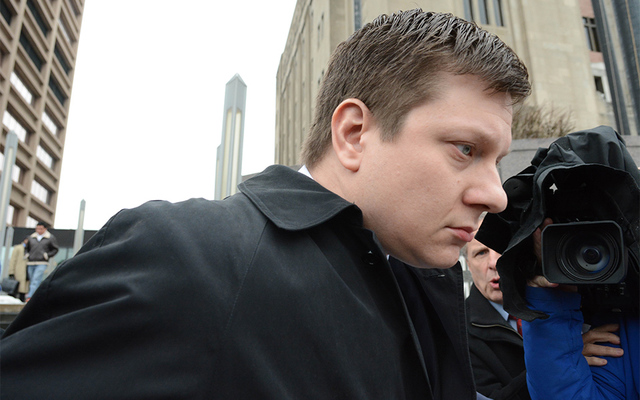CHICAGO — Jason Van Dyke, the Chicago police officer charged with murder for the 2014 shooting death of Laquan McDonald, pleaded not guilty during a brief court appearance Tuesday morning, setting a case that has stirred emotions here and across
CHICAGO — Jason Van Dyke, the Chicago police officer charged with murder for the 2014 shooting death of Laquan McDonald, pleaded not guilty during a brief court appearance Tuesday morning, setting a case that has stirred emotions here and across the country on a course toward trial.
Van Dyke, who is free on bond and arrived at court dressed in a dark suit and blue tie, stood silently before Judge Vincent Gaughan as his lawyer, Dan Herbert, entered the not-guilty plea. Van Dyke was charged last month with murder just hours before dashcam video of him shooting McDonald 16 times was released, setting off protests and calls for changes to policing here.
After court, Herbert said that Van Dyke was eager for his side to be made public and that his client believed he was innocent of the first-degree murder and official misconduct charges he faces.
“He wants his story to get out so that people don’t see him as this coldblooded killer,” Herbert said. “But that’s what the trial is for.”
Herbert had previously said he might seek a change of venue for the trial, citing intense media scrutiny and Mayor Rahm Emanuel’s critiques of Van Dyke. Herbert said Tuesday that he was continuing to consider such a request, but for now was satisfied with the selection of Gaughan, of the Circuit Court of Cook County, to hear the case.
McDonald, who was 17 and black, was carrying a knife when he was shot on Oct. 20, 2014, but appeared to be veering away from the police when Van Dyke began firing. The gunshots continued after McDonald collapsed on the street. Van Dyke told investigators he had feared for his safety.
McDonald’s great-uncle, the Rev. Marvin Hunter, said Tuesday that he wanted federal oversight of the criminal case and expressed doubts about the fairness of the local courts. Hunter said he thought the trial should be televised in the interest of transparency.
“I believe the entire justice system in the County of Cook is corrupt,” Hunter said. “I maintain that, and I need someone to prove me wrong by bringing justice in the Jason Van Dyke case.”
Since Van Dyke’s arrest, the Chicago police have faced heightened scrutiny and urgent calls for change. Emanuel fired the department’s superintendent, the Justice Department has started a broad investigation of Chicago police practices, and protesters have repeatedly marched through downtown.
Many of the demonstrators have said Emanuel’s overtures, including a task force to study police accountability and repeated criticisms, have been insufficient, and have called for him to resign.
That pressure intensified during Emanuel’s holiday vacation to Cuba, which he cut short this week “so that he can continue the ongoing work of restoring accountability and trust in the Chicago Police Department,” a spokeswoman said. Emanuel was expected to arrive back in Chicago on Tuesday afternoon.
On Dec. 26, while the mayor was in Cuba, the Chicago police fatally shot two people while responding to a domestic incident on the city’s West Side. Within hours, the police said one of the people they shot, Bettie Jones, 55, had been an innocent bystander who was “accidentally struck and tragically killed.” The other person, Quintonio LeGrier, 19, was said to have had a baseball bat. The police referred to LeGrier, a college student, as “a combative subject.”
Hunter cited those deaths Tuesday as evidence of a broader problem within the police department, and Herbert said that added media attention to police shootings “probably will never help my client.”
But, Herbert added, the most recent shooting “should not affect my client’s case in any, way, shape or form.”
© 2015 The New York Times Company



